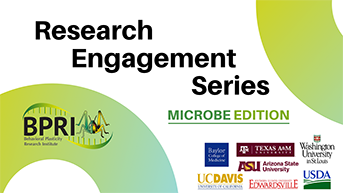Today, NCBI released the genome of the desert locust, sequenced under the direction of Dr. Childers at the USDA, who is also a BPRI faculty member. Please see the associated press release for further details. The new annotated genome is available by following this link.
Author: Fabrizio Gabbiani
-
NCBI Releases second BPRI Genome
The National Center for Biotechnology Information (NCBI) has finished the automated annotation of the Central American locust genome, Schistocerca piceifrons, as of March 28, 2022. This is the second of a set of six genomes that will be processed by NCBI in the coming months and builds up on the release of the Schistocerca americana genome a few weeks ago. The new annotated genome is available at https://www.ncbi.nlm.nih.gov/genome/annotation_euk/Schistocerca_piceifrons/100/
-
NCBI Releases first BPRI Genome
The National Center for Biotechnology Information (NCBI) has finished the automated annotation of the American bird grasshopper genome, Schistocerca americana, as of March 23, 2022. This is the first of a set of six genomes that will be processed by NCBI in the coming months and represents an important milestone for the BPRI. The new annotated genome is available at https://www.ncbi.nlm.nih.gov/genome/annotation_euk/Schistocerca_americana/100/
-
New Article on Grasshopper Olfaction
A paper titled “Invariant odor recognition with ON–OFF neural ensembles” has been published by Dr. Barani Raman and his team at Washington University in St. Louis (WUSTL). The work has been highlighted in the WUSTL newsroom: “The ‘surprisingly simple’ arithmetic of smell”.
-
BPRI Meets with Argentinian Colleague
Mr. Hector Medina, Coordinator, National Grasshopper and Locust Program of the National Food Safety and Quality Service of Argentina recently met with the BPRI outreach committee to share his experience in locust management activities in Argentina. He explained that Argentina mostly follows a farmer-centered mitigation approach. He emphasized that the most critical outcome that his program expects from the BPRI is to provide information on biological factors that contribute to changing the ‘solitarious’ and ‘gregarious’ phases of grasshoppers. These biological factors will help improve the early warning system predicting locust swarming and ultimately help reduce crop harm.
-
BPRI Research Featured on the GLN
The BPRI’s first research engagement series release on the Global Locust Network (GLN) community has reached nearly 100 views. The first series highlights Dr. Britt Peterson‘s microbes research.

Peterson, Brittany Dr. Bugguts Biology lab 08-29-19 
Dr. Peterson explained:
“Microbes are often the invisible drivers of many characteristics that we assume to be determined by the host itself or by the environment. In insects, gut bacteria are known to manipulate a seemingly endless list of traits including behavior, growth, food preferences, and mate selection. These are all traits that may have impacts on locust swarming and migration. I think that understanding the composition of bacterial communities in the locust guts and seeing if they change during phase change can be important for both pesticide and biocontrol efforts to combat swarms.”
-
High-School Students Win Poster Prize
Congratulations to Sai Prasada Manikonda and Sreeram Satish, two high school students working with Herman Dierick! Their poster on orthologs of pigmentation genes in Schistocerca gregaria won first place in the high school category of the 2020 Sigma Xi Student National Research Conference.

Sai Prasada Manikonda 
Sreeram Satish